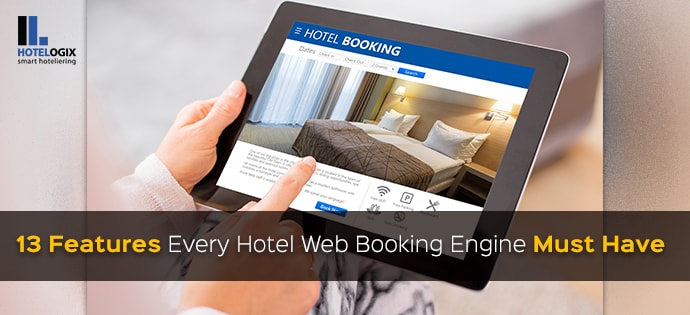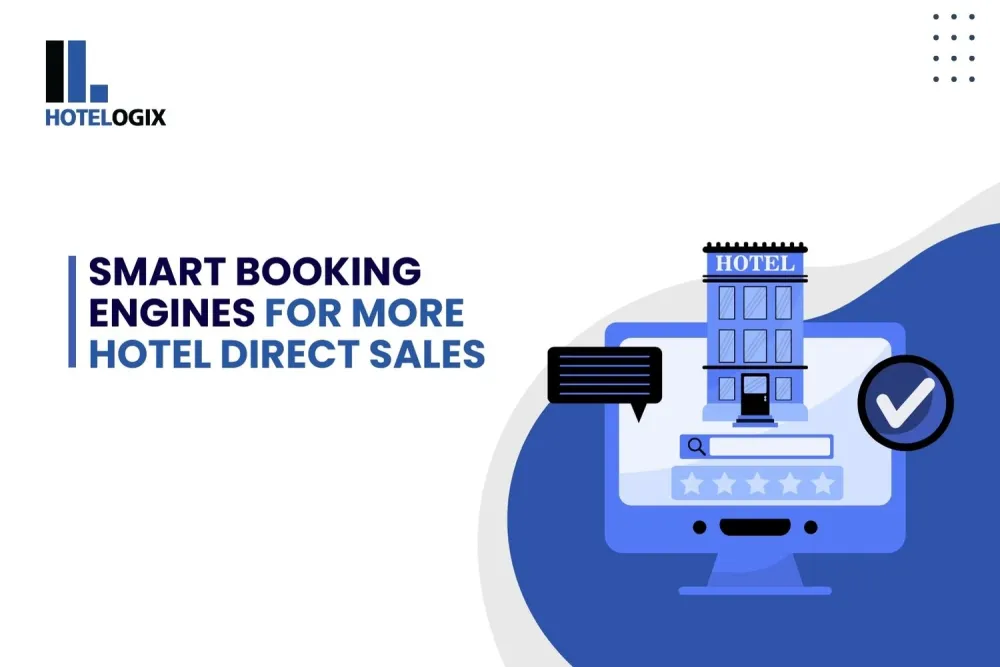Online hotel booking systems have redefined the hotel industry space. Not only have they made hotel reservations easier for guests, they have also made hotels more accessible to guests, regardless of the distance between the hotel and the prospective guests. All your reservation data is collected onto one platform, plus with a sharply-designed booking form, you also make the entire reservation process hassle-free for the bookers.
However, it is essential for hoteliers to make an informed choice while opting for an online hotel booking system. The more feature-rich your Hotel web booking Engine is, the better the yield it can get you, i.e. the higher the ROI. You’ll find out shortly why we say this. But first, let’s understand the meaning and the purpose of an online web booking engine.
What is a booking engine & what it does do?
Quite simply put, a hotel web booking engine essentially is a means to sell your hotel rooms on the internet, either via your website (directly) or via one of your social media pages like Facebook, Instagram, and such platforms (Indirectly). This software application not only allows for secure monetary transactions to take place via a payment gateway but also helps automatically process and collate guest data.
With the increasing number of hotel reservations happening online, the need for an online hotel booking engine in today’s world cannot be overstated. But you don’t just need some booking engine, you need the one that gives you the maximum benefits without costing you a bomb.
Here are 13 important features of an online hotel booking engine.
(And by important, we simply mean non-negotiable!)
1. Customizations to maintain consistency of Web booking page with your hotel brand:
Keep the design of the web booking page consistent with your brand’s look and feel. Consistency is the key to trust building in guest experience. It is also just a common sense- Your guest goes to the web booking page from your brand website or from the ‘book now’ button on your Facebook page. Their journey with you must continue without any rude shocks lest you lose them to skepticism! You want the imagery, the messaging, the color scheme, the fonts, and all the nuances consistent with your brand. Your Hotel Web Booking Engine must allow customization (at least the basic ones!) for you to build this trust in your prospective guests.
2. Virtual tour or an entire gallery of true-to-life images
If the booker has arrived at the web booking page, it is almost certain that they mean business. By providing pictures and highlighting the best features of your property, you can convince them to go ahead and make the reservation. Alternatively, you could also provide a virtual tour at this stage, just to give that last-minute nudge for on-the-fence bookers. But be sure to use real, unaltered and true-to-life ones only!
This is a great feature to have and your web booking engine should provide you with this necessary luxury.
3. Superfast loading time
32% of bookings made on mobile phones are abandoned due to slow loading time. (Source). Your web booking engine must be so light and quick that it should not take long time to load, irrespective of the device.
4. Multi-device compatibility
Make sure your web booking engine is multi-device responsive. In today’s internet-obsessed world, just catering to audiences of a single device doesn’t cut it. While mobile phones have become increasingly popular, tablets and laptops also have their fair share of users. Your potential online booker can be anyone, of any age, using any device of their choice!
Hence, it is paramount to ensure that your hotel Web booking engine is responsive on all devices.
5. Multi-lingual access
Convenience, in the digital era, cannot possibly be higher and is pretty much the mantra of technology. It is almost astounding how one can be seated in the most remote village in one corner of the world but can book a room in a hotel that is thousands of miles away, in the blink of an eye. Thanks to the internet!
This means that you can expect people from just about anywhere in the world, to be searching for hotels like yours. You need to be as inclusive as practically possible to invite bookers from around the world. And having a web booking page solely in English totally defeats the purpose.
To put things in perspective, of the 7.6 billion people in the world (as of 2018), English as a native language is only spoken by 400 million people! Do the math and see why you need to provide more linguistic options for potential bookers to choose from.
6. Catchy, compelling ‘Book Now’ button
There are several articles on the web that are dedicated to the ‘Call to Action’ or in this case, the ‘Book now’ button. The placement, the color, the messaging, the size- everything plays a huge role in determining the success of the page. Understand what works and what doesn’t for you, and pick wisely.
7. Increase chances of an upsell
Yep! That’s right- List out the add-ons and services one can avail at your property, on the web booking page. This gives the guest a peek into what they can expect, at the exact moment when it matters- just before reservation. They should be able to select whatever service/add-ons they wish to avail and pay for it upfront. This gives them something to look forward to during their stay and you, a chance to upsell! This works just as well with upselling rooms as it does with POS services or activities.
Your Online Hotel Booking engine should give you this possibility, so you don’t have to train your staff to upsell relentlessly!
8. Real-time availability
Integrating with a channel manager allows you to provide real-time inventory updates on your online hotel booking engine. Guests should always have clarity on the availability of rooms because otherwise, you run the risk of being overbooked (which, honestly, you must avoid at all costs).
This is a cakewalk, today, because all you need is a cloud PMS with channel manager connect, to display real-time inventory updates on your website.
9. Real-time booking & confirmation
A solid Hotel Web Booking Engine sends out confirmation emails to guests as soon as it receives a booking. This goes a long way in building guest loyalty as it is an instant proof to the guest that you will honor their booking.
Your Web booking engine must be able to send out automated mails against every booking in real-time.
10. Secure payment gateway-
Because online transactions involve taking credit card details and other sensitive data from your guests, you need to make sure that you tie up with a payment gateway that is reliable and secure in every way possible. A PCI DSS certification is a foolproof way to determine this. Go for a booking engine that integrates with the best payment gateways.
11. Multi-currency payment options
This is very similar to the linguistic options which we discussed. You need to make things as easy as you possibly could, for the prospective guest. And that, definitely, includes currency talks! We all prefer making buying decisions in the currency that we are used to. Extend that familiarity to your guests too.
12. Social media integration
This one is so basic, that we almost didn’t include it on the list. But it is extremely important to have your Facebook page linked to your Web booking engine. Facebook and Instagram provide the option of directly booking through them- meaning, click on the ‘book now’ button and you are are routed to your web booking page. The web booking engine you opt for must allow for social media integration.
13. Reporting features
Like we saw in the introduction, the purpose of an online hotel booking system is also to collate and process reservation and guest data. This helps you conduct some deeper analysis and gather insights into booking trends and your guests. This is something your Web booking engine must be equipped to provide you with, considering how guest experiences is more important today than it has ever been.





